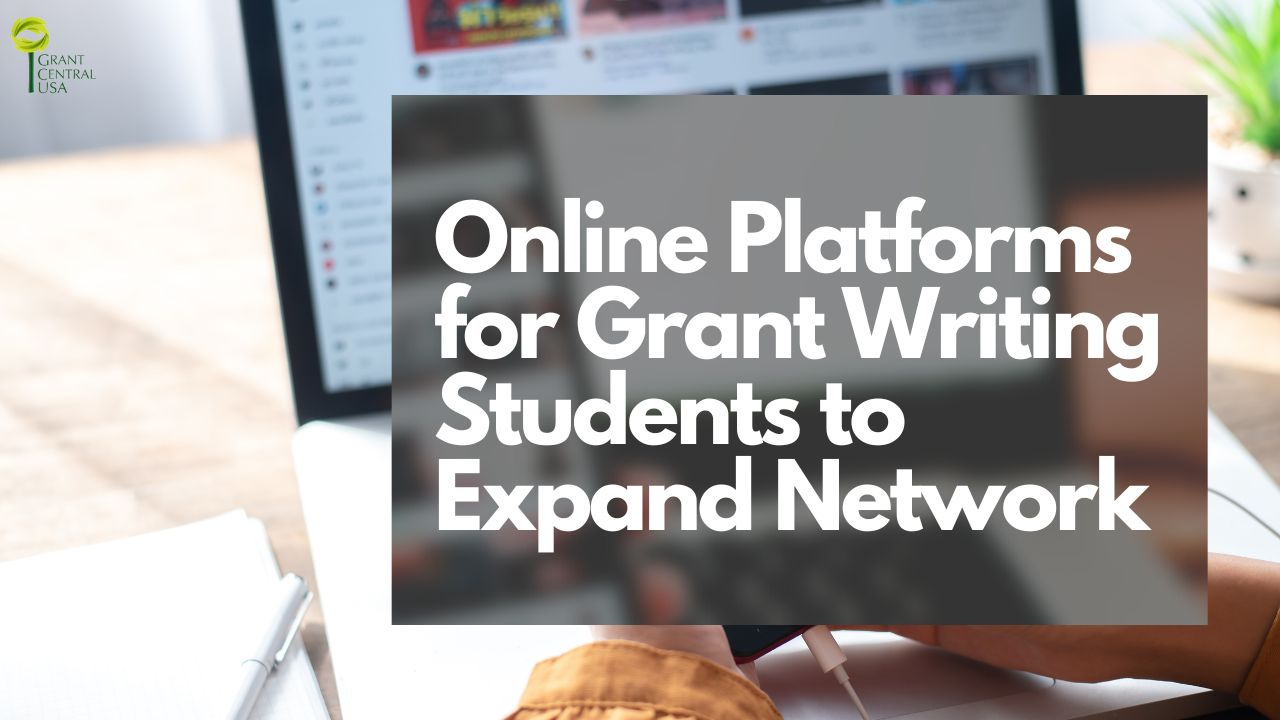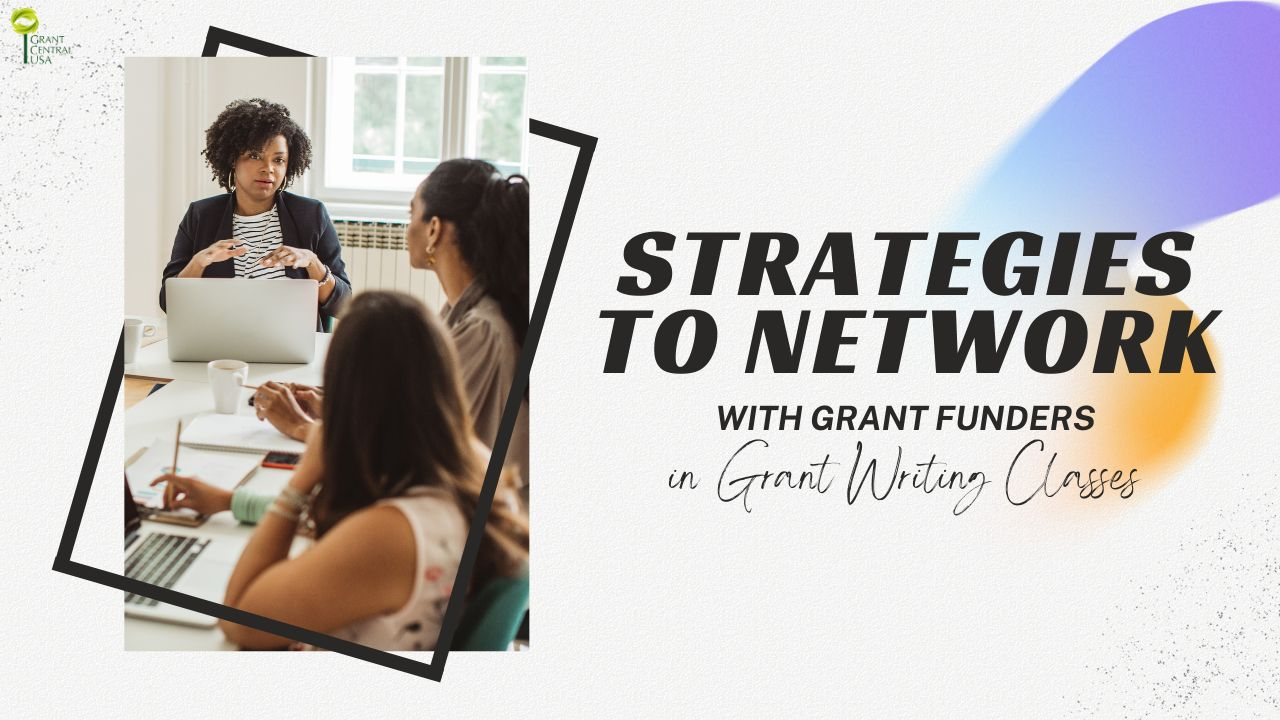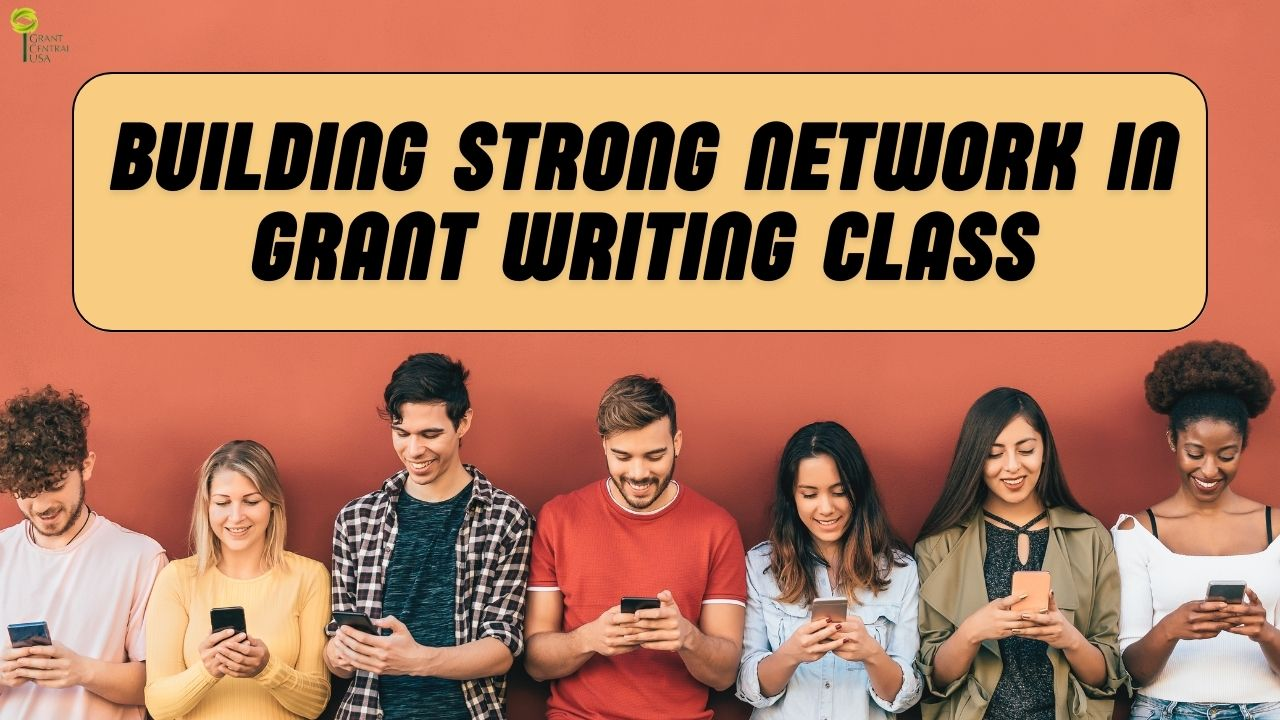Networking Opportunities in Grant Writing Classes on Writing Grants


In the world of grant writing, the ability to secure funding can often be a game-changer for organizations and individuals striving to make a difference. However, there's more to becoming a successful grant writer than just mastering the art of crafting compelling proposals. One often underestimated but incredibly valuable aspect of this journey is networking. In this blog post, we'll delve into the world of grant writing classes and explore the numerous networking opportunities they offer. Discover how these classes not only enhance your grant writing skills but also provide a platform for connecting with like-minded professionals, mentors, and potential collaborators who can open doors to funding and career advancement. So, if you're ready to supercharge your grant writing journey, let's dive into the world of networking opportunities in grant writing classes.
How can participating in grant writing classes enhance your professional network?

Participating in grant writing classes can significantly further develop grant writing skills and enhance your professional network within the realm of grant writing and beyond. These courses serve as fertile ground for cultivating relationships with fellow grant writers, instructors, and industry experts. By engaging with peers who share your passion for securing funding, you create a network of like-minded individuals who can offer support, advice, and collaborative opportunities. Instructors, often seasoned grant writers themselves, can become valuable mentors and connectors, introducing you to their own networks. As you work together on grant proposals and receive constructive feedback, bonds strengthen, leading to future collaborations. Moreover, some grant writing courses facilitate access to local networking events, conferences, and professional associations related to grant writing, opening doors to a broader community of professionals. In essence, participation in grant writing classes not only hones your grant writing skills but also fosters relationships that can be instrumental in your career advancement as a grant writer.
What are the key benefits of networking with fellow students in grant writing courses?

Networking with fellow students in grant writing courses offers numerous key benefits, particularly within the nonprofit sector and for individuals seeking grant opportunities and funding research.
1. Shared Insights and Experience
Interacting with classmates allows you to tap into a diverse pool of experiences and perspectives related to grant writing. This shared knowledge can provide valuable insights into effective strategies and approaches for securing funding.
2. Collaborative Opportunities
Collaborating with fellow students on grant proposals and funding research projects can lead to more comprehensive and innovative proposals. Working together to write grant proposals can also help distribute the workload and improve the quality of your submissions.
3. Peer Support and Feedback
Networking with peers provides a built-in support system. You can exchange feedback on each other's work, helping to refine grant proposals and research efforts. Constructive criticism from fellow students can lead to improved and successful grant proposals and applications.
4. Access to Resources
Fellow students often bring a wealth of resources to the table, such as access to databases, research materials, and grant-related tools. Sharing these resources can enhance the quality of your funding research.
5. Study Groups
Forming study groups with classmates can aid in comprehending and mastering the writing course material. These groups offer a supportive environment for discussing challenging concepts and reinforcing your understanding of grant writing principles.
6. Networking Beyond the Classroom
Building connections with fellow students can extend beyond the classroom. As you complete your courses and work toward obtaining a professional certificate in grant writing, these connections can evolve into long-term professional relationships.
7. Exploration of Career Paths
Networking with classmates may expose you to a wide range of career paths within the nonprofit sector. Conversations with peers can help you identify areas of interest and potential job opportunities.
8. Referrals and Recommendations
Your classmates can become valuable references for future job applications or collaborations. Having peers who can vouch for your skills and dedication can enhance your credibility within the grant writing field.
In summary, networking with fellow students in grant writing courses offers a multitude of advantages, from collaborative opportunities and shared resources to peer support and career exploration. These connections can greatly enrich your learning experience and boost your effectiveness as a grant writer in the nonprofit sector, ultimately contributing to your success in securing advanced grant writing opportunities.
Are there specific online platforms or communities that grant writing students can join to expand their network?

Certainly, there are several online platforms and communities that grant writing students can join to expand their network and connect with professionals in the field best grant well. One prominent organization is the Grant Professionals Association (GPA), which serves as a hub for grant writers and grant professionals. Here are some online platforms and communities to consider:
1. Grant Writers Association (GWA): GPA is an association for grant writers and grant professionals. They offer resources, webinars, conferences, and networking opportunities for grant writing course both newcomers and experienced grant writers. Becoming a member of GWA allows you to access their online community and connect with professionals in the grant writing field.
2. LinkedIn: LinkedIn is a valuable platform for networking in any industry, including grant writing. Joining LinkedIn groups related to grant writing, nonprofit management, and fundraising can help you connect with professionals, participate in discussions, and stay updated on industry trends.
3. GrantChat on Twitter: GrantChat is a Twitter chat that brings together grant professionals every Tuesday. Participating in these chats allows you to engage with others in real-time, share insights, and build connections within the grant writing community.
4. Grant Professionals Network: Many regions have local or regional grant writing certification and professionals networks. These networks often have online forums or mailing lists where grant writers can connect, share resources, and learn about local events and opportunities.
5. Online Forums and Discussion Boards: Websites like GrantSpace and GrantWatch have discussion boards where grant writers can seek advice, share experiences, and network with others in the field.
6. Facebook Groups: There are numerous Facebook groups dedicated to grant writing, fundraising, and nonprofit work. Joining these groups can provide a platform for networking and sharing knowledge.
7. Professional Development Platforms: Websites like Coursera, edX, and LinkedIn Learning offer online courses and certifications in grant writing. These platforms often have discussion forums or communities where students can connect with instructors and peers.
8. Blogs and Publications: Following grant writing blogs and publications can help you stay informed about industry news and connect with professionals who contribute to these resources.
Remember that networking is not limited to online platforms. Attending webinars, virtual conferences, and local events related to grant writing can also be effective ways to expand your network. Building and nurturing connections within the grant writing community can be invaluable for both your career development and success in securing grants.
What strategies can students use to effectively network with potential grant funders during these classes?

Networking with potential grant funders during grant writing classes requires a thoughtful and strategic approach. Here are some effective strategies for students to consider:
1. Research Grant Funders: Before attending classes, research grant funders and organizations that align with your interests and project goals. Familiarize yourself with their missions, funding priorities, and application processes. This knowledge will enable you to engage in more meaningful conversations with potential funders.
2. Attend Guest Lectures and Workshops: Many grant writing classes invite guest speakers who are representatives of grant-making organizations. Attend these sessions and actively participate in discussions. It's an excellent opportunity to connect with potential funders, ask questions, and express your interest in their work.
3. Engage in Q&A Sessions: During classes or presentations, take advantage of Q&A sessions to ask relevant questions about funding opportunities. This not only demonstrates your interest but also allows you to interact directly with potential funders.
4. Participate in Networking Events: Some grant writing classes may organize networking events, workshops, or conferences. Attend these gatherings, as they often attract funders and professionals from the nonprofit sector. Prepare an elevator pitch to introduce yourself and your project to potential funders.
5. Leverage Class Assignments: If class assignments involve real-world grant proposal development or writing, consider selecting a project that aligns with the interests of potential funders you want to connect with. This can serve as a practical way to showcase your skills and engage with funders in a meaningful context.
6. Engage on Social Media: Follow grant-making nonprofit organizations and funders on social media platforms like LinkedIn, Twitter, and Facebook. Interact with their content by sharing, commenting, and engaging in discussions. This can help you get noticed and initiate online connections.
7. Request One-on-One Meetings: If you identify potential funders who are open to networking, consider reaching out to request one-on-one meetings or informational interviews. Use these meetings to learn more about their priorities, share your project ideas, and seek advice on successful grant applications.
8. Showcase Your Expertise: Share your knowledge and expertise in grant writing through blog posts, articles, or presentations. By positioning yourself as a subject matter expert best grant writing, you can attract the attention of funders interested in your field.
9. Follow Up: After initial interactions, be sure to follow up with potential funders. Send a personalized thank-you email and express your gratitude for their insights and advice. Maintaining communication can help nurture these relationships over time.
10. Join Professional Associations: Consider joining professional associations related to your field, as they often offer networking events and opportunities to connect with funders. Associations like the Grant Professionals Association (GPA) can be particularly beneficial.
Remember that effective networking is built on genuine relationships and mutual interests. Be authentic, respectful, and genuinely interested in the work of potential funders. Over time, these connections may lead to valuable partnerships and funding opportunities for your projects.
Are there alumni networks or associations associated with grant writing programs that offer networking opportunities?

Yes, many grant writing programs and institutions have alumni networks or associations that offer valuable networking opportunities for individuals who have completed grant writing programs or the best grant writing courses. These alumni networks and associations can be instrumental in connecting you with fellow professionals, mentors, and potential collaborators within the field of grant writing. Here's how they can benefit you:
1. Networking Opportunities
Alumni networks often host events, webinars, and conferences specifically tailored to grant writing professionals. These gatherings provide a platform for connecting with alumni who have similar career interests and goals.
2. Mentorship Programs
Some alumni associations offer mentorship programs where experienced grant writers can guide and support newcomers in the field. This can be a valuable resource for skill development and career advice.
3. Job and Project Opportunities
Alumni networks frequently share job postings, freelance opportunities, and online grant writing-related projects within their communities. This can be a useful resource for finding employment or additional grant writing projects.
4. Professional Development
Many associations affiliated with the grant writing certificate programs provide access to continued professional development opportunities, including workshops and seminars. These events help you stay current with industry trends and expand your skill set.
5. Access to Resources
Alumni associations may offer access to grant databases, research materials online course,, or other resources that can assist you in your grant writing efforts.
To leverage these networking opportunities, it's essential to stay connected with your grant writing program's alumni network or association. Joining, participating in events, and actively engaging with fellow alumni can help you build a strong professional network and stay informed about the latest developments in the field of grant writing.
In what ways can attending workshops or conferences related to grant writing classes help students build a stronger network?

Attending workshops or conferences related to grant writing classes can significantly bolster a student's professional network through various avenues:
1. Meet Industry Professionals: Workshops and conferences attract professionals from various sectors, including grant writers, program managers, and representatives from grant-making organizations. These events provide a platform to meet and interact with individuals who share your passion for grant writing.
2. Networking Sessions: Organizers often include dedicated networking sessions where attendees can engage in one-on-one or group discussions. These sessions are ideal for initiating conversations, exchanging contact information, and forging connections with peers and experts.
3. Knowledge Sharing: Conferences feature keynote speakers, panel discussions, and breakout sessions led by experts in the field. Engaging with these speakers not only enhances your understanding of grant writing but also offers opportunities for personal introductions and networking.
4. Exhibition Halls: Many conferences include exhibition halls where grant-making organizations, nonprofits, and service providers showcase their work. Visiting these booths allows students to interact with representatives, learn about funding opportunities, and establish contacts with potential funders.
5. Special Interest Groups: Workshops and conferences may offer special interest or affinity group meetings. These gatherings enable students to connect with like-minded individuals who share specific areas of interest or expertise.
6. Volunteer Opportunities: Some events provide opportunities to volunteer or assist with event organization. Volunteering can be an excellent way to interact with speakers, attendees, and organizers, fostering valuable connections.
7. Social Media Engagement: Conferences often have official hashtags and dedicated social media channels. Engaging with these platforms allows attendees to connect with one another, share insights, and arrange meetups during the event.
8. Interactive Workshops: Participating in hands-on workshops or collaborative activities can lead to meaningful interactions with fellow attendees. These sessions provide a common purpose for engagement and networking.
9. Feedback and Collaboration: If you have projects or research to showcase, conferences often include opportunities for presentations or poster sessions. Presenting your work can attract interest and feedback, potentially leading to collaborations.
10. Post-Conference Follow-Up: After the event, follow up with individuals you met by sending personalized emails, connecting on professional networking platforms, or scheduling follow-up meetings. Continued communication is essential for nurturing and strengthening new connections.
11. Membership in Professional Associations: Some conferences may introduce students to professional associations or organizations related to grant writing. Joining these associations can provide ongoing networking opportunities and access to resources.
In conclusion, attending grant writing workshops and conferences can be a pivotal step in building a stronger professional network. These events offer a dynamic environment for meeting industry professionals, sharing knowledge, and establishing connections that can lead to career advancement and increased success in securing government grants yourself.
How do peer review and collaboration in grant writing courses contribute to networking opportunities?

Peer review and collaboration in grant writing courses contribute significantly to networking opportunities in several ways:
1. Fostering Relationships:
Collaborative activities and peer review processes require students to work closely with their classmates. This fosters the development of relationships and connections within the class.
2. Shared Learning Experience:
Collaborating on grant proposals or reviewing each other's work provides a shared learning experience. Students can learn from one another's strengths and areas for improvement, which can lead to mutual respect and a sense of camaraderie.
3. Constructive Feedback:
Peer review involves providing and receiving constructive feedback. This feedback is valuable for improving grant proposals and refining grant writing skills. Engaging in this process builds trust and reciprocity among students.
4. Networking Conversations:
While collaborating on projects or offering feedback, students often engage in discussions about their goals, interests, and aspirations in the field of grant writing. These conversations can naturally lead to networking as students learn more about each other's backgrounds and objectives.
5. Collaborative Opportunities:
Through collaboration, students may discover complementary skills or areas of expertise among their peers. This can lead to opportunities for future collaborations on grant proposals, research projects, or nonprofit initiatives.
6. Peer Support:
Networking opportunities can extend beyond the classroom when students provide support to each other in their grant writing endeavors. Sharing resources, tips, and job leads online grant writing course can be common in a collaborative and supportive class environment.
7. Building Trust:
Trust is a fundamental aspect of networking. Collaborating and receiving feedback from peers allows students to build trust with one another. Trust can later translate into referrals, recommendations, or introductions to other professionals in the field.
8. Expanding Perspectives:
Working with diverse classmates from various backgrounds can broaden your perspectives and expose you to different approaches to grant writing. This diversity can be an asset when networking with professionals who value a broad range of experiences.
9. Networking Beyond the Classroom:
As students progress in their careers, the connections formed through collaboration and peer review can extend beyond the classroom. Former classmates can become part of your professional network, offering ongoing support and opportunities.
10. Mutual Growth:
Networking is not just about what you can gain; it's also about how you can contribute. Collaborating with peers and offering thoughtful feedback can position you as a valuable and supportive member of your network.
In summary, peer review and collaboration in grant writing courses create a conducive environment for networking by fostering relationships, promoting shared learning experiences, and providing opportunities for constructive feedback and collaboration. These connections can lead to lasting professional relationships and enhance your network within the grant writing field.
What tips or advice can you share for students looking to make the most of networking opportunities in grant writing classes?

Certainly! Making the most of networking opportunities in grant writing classes requires a strategic approach and active engagement. Here are some tips and advice for students:
1. Set Clear Goals:
Define your networking objectives. Are you seeking mentors, collaborators, job opportunities, or funding connections? Having clear goals will guide your networking efforts.
2. Prepare an Elevator Pitch:
Craft a concise and compelling elevator pitch that introduces yourself, your interests, and your goals as a grant writer. This helps you make a memorable impression during networking events.
3. Engage Actively in Class:
Participate actively in class discussions, group projects, and peer review sessions. Your involvement can lead to organic networking as you collaborate with classmates and instructors.
4. Research Your Peers:
Get to know your fellow students. Take the time to understand their backgrounds, interests, and career aspirations. This knowledge can help you identify potential networking opportunities.
5. Attend Networking Events:
If your grant writing class organizes networking events, workshops, or conferences, make an effort to attend. These gatherings are designed for connecting with professionals in the field.
6. Listen Actively:
When engaging in conversations, focus on active listening. Show genuine interest in what others have to say, ask questions, and seek to understand their perspectives.
7. Exchange Contact Information:
Don't hesitate to exchange contact information with individuals you meet. Follow up with a personalized message expressing your interest in staying connected.
8. Utilize Social Media:
Connect with your peers, instructors, and industry professionals on professional networking platforms like LinkedIn. Engage in discussions and share relevant content to stay visible.
9. Offer Value:
Networking is a two-way street. Be willing to offer help or share resources when appropriate. Providing value to your network can enhance your reputation and strengthen connections.
10. Follow Up:
After networking events or meetings, follow up with a thank-you message or email. Express your appreciation for the conversation and indicate your interest in continuing the dialogue.
11. Maintain Relationships:
Networking is not just about making initial connections. Nurture and maintain these relationships over time. Stay in touch with your network by periodically reaching out or providing updates on your career progress.
12. Seek Mentorship:
If you identify individuals who can serve as mentors or advisors, approach them with a request for guidance. Mentorship can be a valuable component of networking.
13. Be Genuine:
Authenticity is key to successful networking. Be yourself and build connections based on shared interests and goals rather than superficial interactions.
14. Stay Informed:
Stay updated on industry trends, news, and best practices in grant writing. Being well-informed can lead to more meaningful conversations with fellow professionals.
15. Practice Patience:
Building a strong network takes time. Don't expect immediate results. Be patient and persistent in your networking efforts.
Remember that networking is an ongoing process, and the relationships you cultivate during grant writing classes can have a lasting impact on your career. Approach networking with a genuine and generous mindset, and you'll find that it can be a rewarding and valuable aspect of your professional journey in grant writing.






